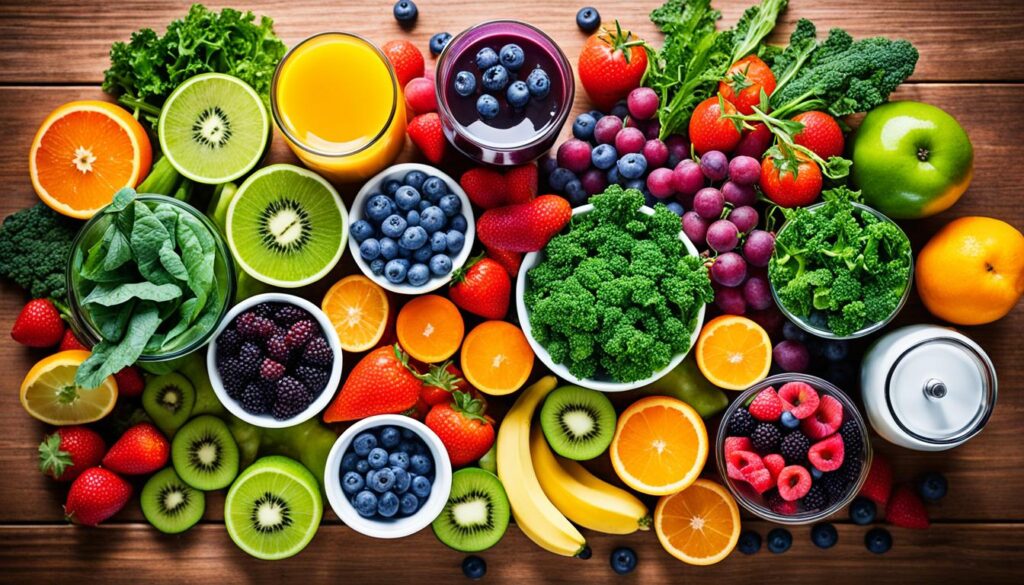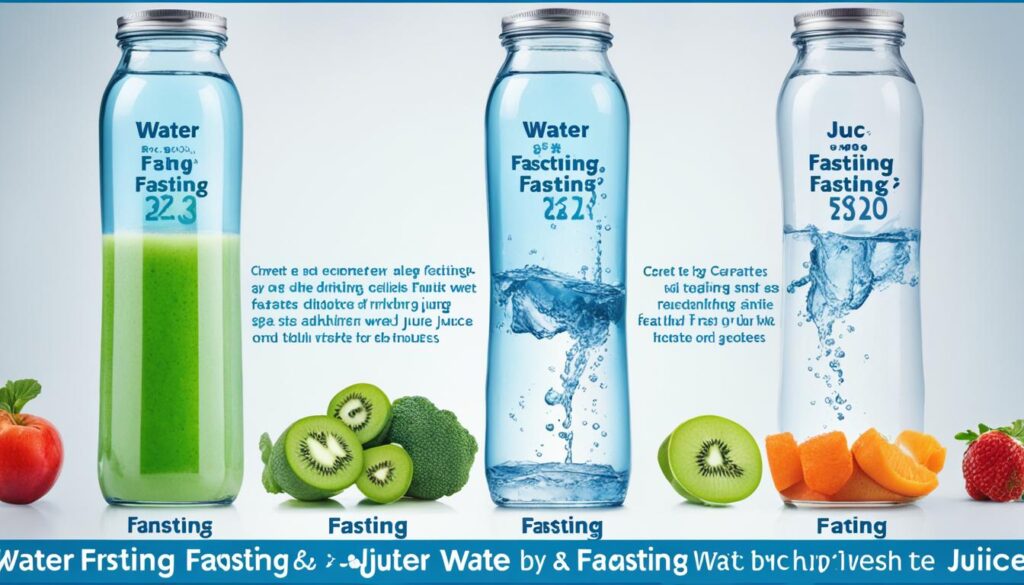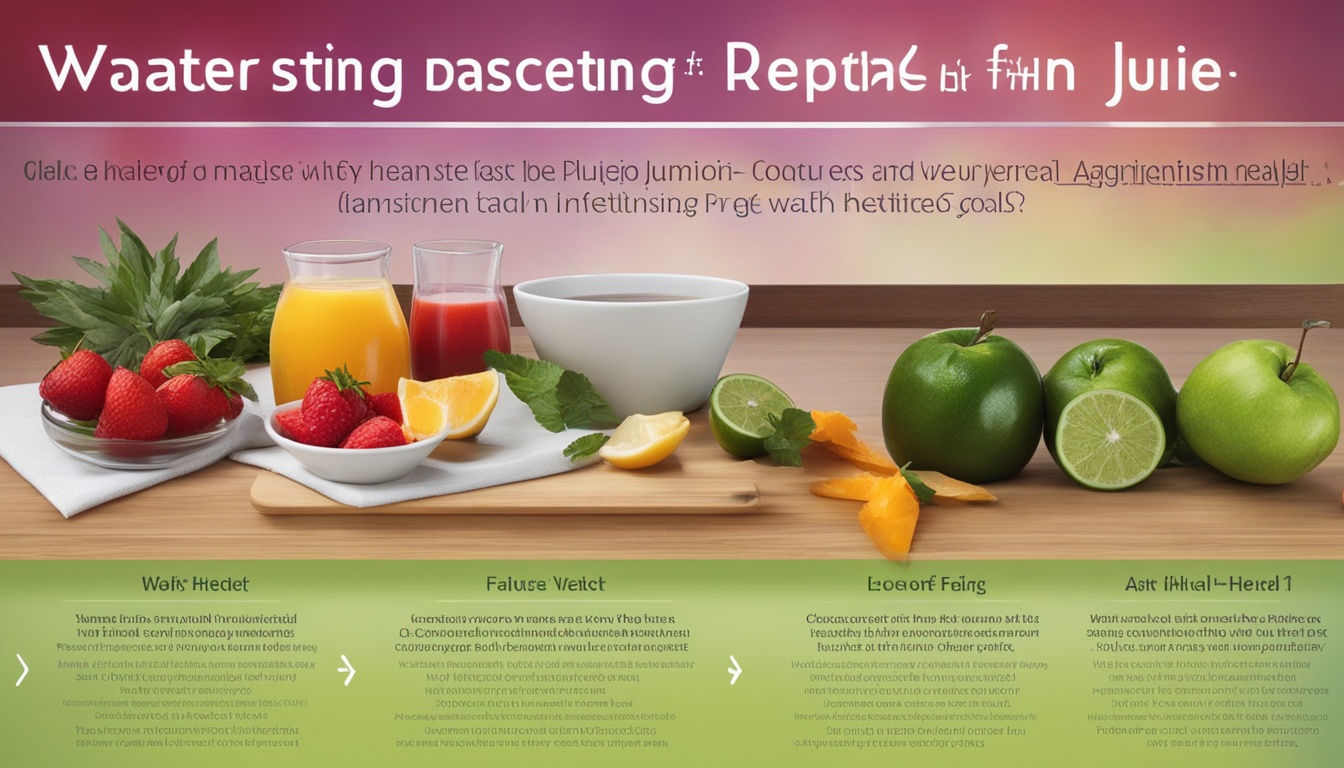Fasting has become a popular way to improve health. It helps with weight loss, detox, and overall well-being. Water Fasting vs. Juice Fasting is a big debate. Each method has its own benefits and goals.
Water fasting means not eating and only drinking water. It can last from 12 to 72 hours. You should drink 2 to 3 liters of water a day, preferably mineral water, to get important electrolytes.
Juice fasting lets you drink fruit and vegetable juices but not solid food. You get nutrients from cold-pressed, organic juices. Juice fasts can last from two to five days, offering flexibility.
The benefits of water fasting and juice fasting are significant. But, so are the risks. Knowing these can help us choose the right fasting method for our health.
Water fasting starts ketosis in 24 hours, causing quick weight loss and less inflammation. This may lower heart disease risks. Juice fasting boosts energy and mental focus with nutrients, helping overall health and gentle detox.
Key Takeaways:
- Water fasting triggers ketosis, leading to quick weight loss and detoxification.
- Juice fasting provides essential nutrients through cold-pressed, organic juices.
- Both fasting methods reduce pressure on the digestive system for a potential reset.
- Mineral water is recommended during water fasting to replenish electrolytes.
- Longer water fasts should be conducted every 2-3 months for deeper detoxification.
Introduction to Fasting for Health
Fasting for health has become very popular lately. It means not eating or eating certain foods for a while. People say it helps with weight loss, better metabolic health, and detoxing the body. Let’s explore its history and how it’s used today.
Historical Context of Fasting
For thousands of years, fasting has been a part of many cultures and religions. The ancient Egyptians used it to purify themselves. The Greeks fasted to improve their health.
Fasting is also found in religious texts like the Bible, Quran, and Talmud. It was seen as a way to connect spiritually and for health. Ancient doctors even recommended it as a treatment.
Modern Day Fasting Practices
Today, fasting has changed to fit our busy lives and health goals. Intermittent fasting is popular, where you eat only during certain times. Detox fasting is another type, focusing on liquids to clean the body.
Historical and modern fasting share a focus on the body’s healing powers. Many now fast to support autophagy, the process of breaking down and recycling old cells. This can help prevent chronic diseases and increase life span. Despite the many fasting methods, the core idea is the same: giving the body a break to heal and refresh.
What is Water Fasting?
Water fasting means not eating or drinking anything except water for a certain time. This can be from 24 to 72 hours. People do this to help their health, especially with detox and losing weight.
Definition and Process
During water fasting, you only drink water for a few days. You should drink about two to three liters of water each day. It’s important to get a doctor’s advice if you plan to fast for more than 72 hours. Fasting for too long can cause dehydration, imbalance of electrolytes, and kidney problems.
One big benefit of water fasting is autophagy. This is when the body gets rid of damaged cells. It might help prevent diseases like cancer, Alzheimer’s, and heart disease. Shorter fasts can also make your body more sensitive to insulin and lower your blood triglyceride levels. This can help prevent heart disease and control blood sugar.
| Duration | Daily Water Intake | Key Benefits |
|---|---|---|
| 24–72 hours | 2–3 liters | Autophagy, insulin sensitivity, lower triglyceride levels |
Dry Fasting vs Water Fasting
Dry fasting means not eating or drinking anything, including water. It’s different from water fasting, which lets you drink water. Dry fasting can be risky and should only be done for a short time with a doctor’s watchful eye.
Water fasting is safer because it helps your body get rid of toxins by staying hydrated. Drinking mineral water can make this process better by adding important minerals. These minerals help your body work better and detox faster.
Fasting for weight loss with water can lead to quick results because you’re cutting calories. But, it’s important to be careful and get advice to stay safe and get the most benefits.
What is Juice Fasting?
Juice fasting is a way to detox your body by drinking fruit and vegetable juices. You also drink herbal teas and water to stay hydrated. It’s different from water fasting because it gives you important nutrients that keep your energy up while you cleanse.
Definition and Process
Juice fasting means you only drink juice for a while. You aim to have 1-3 liters of juice each day. This juice is mixed with water and split into 3-5 servings throughout the day.
This method helps your body focus on healing and refreshing itself. It does this by reducing the work your digestive system has to do.
Types of Juices Used
The juices used in these fasts are organic and made without heat. This keeps the nutrients in the fruits and vegetables safe. You’ll often find juices made with leafy greens, apples, carrots, beets, and citrus fruits.
These juices are key to many detox recipes. They give you a mix of vitamins, minerals, and antioxidants.
Preparation for Juice Fasting

Getting ready for a juice fast is important. You should stop eating processed foods, caffeine, and other stimulants a few days before. This helps your body get ready for the detox.
Light exercise and drinking water and herbal teas can also help. When you start eating solid foods again, do it slowly. Start with whole, raw fruits and vegetables.
Benefits of Water Fasting
Water fasting is gaining attention for its health perks. It means not eating anything and only drinking water. This gives the body a chance to detox and fix itself.
Digestive Reset
Water fasting helps reset the digestive system. It gives our digestive system a break from food. This rest helps the gut and starts a deep detox.
Without food, the digestive system stops working. This leads to a full detox. It helps clear out waste and toxins in the digestive tract.
Metabolic Boost
Water fasting also boosts metabolism. When we stop eating, our body uses stored fats for energy, entering a state of ketosis. This helps with fat loss and fixing the body.
This detox process can help with weight loss and improve health issues like arthritis and asthma. Drinking mineral-rich water during the fast can also help with metabolism.
But, it’s important to be careful with water fasting. Always talk to a doctor, especially if you have health issues or plan a long fast. Starting with shorter fasts and then moving to longer ones can be a good way to ease into it.
Benefits of Juice Fasting
Juice fasting is becoming more popular for its health benefits. It helps with nutrition and keeps energy levels up. Let’s look at how it can make us healthier.
Nutritional Intake
One big plus of juice fasting is getting more nutrients. Studies show that blended drinks have more antioxidants than just eating fruits like apples and pears. This means we get more polyphenols, which can fight chronic diseases.
Even though it doesn’t change blood levels of vitamin C much, a three-month study found a boost in antioxidants from drinking carrot juice daily.
Variety and Versatility
Juice fasting also offers a lot of variety and flexibility. Using different juices can help control cravings and keep things interesting. Juices from veggies like spinach and carrots are packed with nutrients and make up a big part of our vegetable intake.
This helps avoid blood sugar spikes and keeps us feeling energized. Adding honey can even lower bad fats in the blood, reducing heart and inflammation risks.
Energy and Sustenance
Juice fasting gives us energy and keeps us going, unlike water fasting. It helps us stay active during the fast. Studies show it can lower bad cholesterol and use fat for energy.
But, it’s important to watch what we eat to avoid missing out on important nutrients. Not getting enough protein can lead to losing muscle and feeling hungry all the time.
In short, juice fasting has many benefits. It boosts health with more vitamins and minerals, increases energy, and helps with digestion. With careful planning, we can use juice fasting to improve our health and well-being.
Comparison: Water Fasting vs. Juice Fasting: Which is Better?
When comparing fasting methods, it’s key to know how they work in the body. Water fasting and juice fasting both aim to help with detox and weight loss. But they do it in different ways. This helps people pick the best method for them.
Bodily Processes
Water fasting helps the body enter a state called ketosis. This process cleanses the body and regenerates cells. It also boosts the removal of toxins and cell oxygenation.
Juice fasting, on the other hand, is a slower detox process. It uses juices full of nutrients to keep the body running smoothly. This method is great for colon cleansing and boosting the immune system.

Duration and Sustainability
Water fasting is usually done for shorter periods because you don’t eat anything. This can make it hard to keep up energy levels for a long time.
Juice fasting, however, can last longer—up to a week or more. This is because juices, broths, and herbs provide nutrients. A study found that a two-week juice fast can clear the body of toxins and support health.
Impact on Energy Levels
Juice fasting keeps energy levels up with the help of juices and other supportive practices. This makes fasting more comfortable. Water fasting, though, can make energy levels drop, making it hard to be active.
Yet, both fasting types improve mental focus and physical health. Juice fasting also helps with willpower and spiritual growth.
For more details on these fasting methods, check out Andrea Cox’s juice fast vs. water fast.
Potential Risks and Precautions
When thinking about fasting, knowing some fasting precautions is key for our health and safety. Both water fasting and juice fasting have risks we should know about.
Water fasting, which can last from 24-72 hours, has benefits like boosting autophagy and lowering blood pressure. But, fasting for too long without a doctor’s advice is risky. It can lead to severe calorie loss, feeling very tired, dizzy, and having imbalances in electrolytes.
Those fasting for weight loss or detox should get ready first. It’s better to eat smaller meals or fast for 3-4 days at a time. Drinking about 2-3 liters of water a day during the fast is important. But, when you start eating again, do it slowly to avoid refeeding syndrome.
Water fasting can also cause muscle loss, dehydration, and low blood pressure. It can make some health issues worse, like gout and eating disorders. The risks of losing too much weight and dehydration, like feeling dizzy or having low blood pressure, show why we need to be careful and get medical advice.
Juice fasting is also not without its risks. It might help with detox and weight loss at first, but you might gain weight back after. Eating too few calories from juices can lead to eating disorders and other health problems.
A study in 2017 found people lost about 3.75 pounds after a 3-day juice cleanse but didn’t feel better. Juice cleanses lack fiber, which can affect how well your body absorbs nutrients. Drinking juices with added sugars can lead to obesity and diabetes.
There’s little proof that detox claims from fasting are true. Instead, eating a balanced diet with whole fruits and vegetables is better. Intermittent and plant-based diets are good for weight control and lowering heart disease risk without the sudden changes of juice cleanses.
So, when fasting, let’s take fasting precautions seriously. This ensures our safety and reduces health risks. It helps us make smart, health-focused choices.
Fasting for Beginners: Getting Started
Starting a fasting routine can feel both exciting and a bit scary. Whether you’re looking into intermittent, water, or juice fasting, planning is key. Here are some steps to help beginners start their fasting journey smoothly and safely.
Consult a Professional
It’s a good idea to talk to a healthcare professional before fasting, especially if you’re new to it. They can make sure your fasting plan fits your health needs. Places like Two Roads Wellness Clinic offer support from therapists, nutrition experts, and life coaches. A tailored plan can reduce risks and boost benefits.
Gradual Introduction
Starting slow is important when you’re new to fasting. Try intermittent fasting, which means eating during a 4 to 10-hour window and fasting the rest of the day. Start with a 12-hour fast and slowly increase it as you get used to it. This approach helps ease your body into it and makes it easier to stick with.
Eliminating Toxins Beforehand
Getting ready for fasting is crucial for a good experience. Cut out processed foods, caffeine, and sugars from your diet. Eat more fruits, vegetables, lean proteins, and whole grains. This helps lower toxin levels in your body, making fasting easier and more effective.
Here is a table summarizing some common fasting durations and their specific preparations:
| Fasting Type | Duration | Preparation Tips |
|---|---|---|
| Intermittent Fasting | 16 hours fast | Stay hydrated, reduce meal sizes before starting. |
| Juice Fasting | 1-20 days | Use organic produce, follow a 4:1 vegetable to fruit ratio. |
| Water Fasting | 1-7 days | Consult a professional, start with shorter fasts. |
Fasting can be a rewarding experience for beginners with the right approach. By getting advice from healthcare professionals, starting slow, and cleaning your diet before fasting, you’re setting yourself up for success.
Conclusion
Water fasting and juice fasting both have their own benefits and challenges. Water fasting can lead to quick weight loss and deep detox. But, it might cause muscle loss and make lean people feel weak. Juice fasting gives the body important nutrients and carbs, helping with detox without much muscle loss. However, it can make you feel tired, irritable, and unfocused.
Choosing the right fasting method is key to meeting your health goals. A five-day juice fast can detox the body and provide some nutrients. Intermittent fasting is good for long-term weight control without losing too much muscle. A study showed that any weight lost from a five-day water fast came back within three months. This shows the importance of making fasting a sustainable habit.
When ending our fasting journey, remember to prepare well and get advice from experts. Picking a fasting plan that fits your needs and eating a diet rich in nutrients can boost fasting benefits. Always pay attention to your body and be careful for the best results.
Source Links
- Inside Detox: Expert Analysis of Water Fasting vs. Juice Fasting from
- Juice Cleanse vs. Water Fast: Which One Is Better?
- Difference Between Juice Cleansing And Water Fasting
- Water Fasting
- Juice cleanse VS. Fasting-mimicking
- Overview of different types of fasting – Buchinger Wilhelmi
- Signs to Stop Water Fasting: Boundary Between Health and Harm – PharmEasy Blog
- Why Juice Cleanses and Water Fasts Can Make You Feel Sick
- Water Fasting and Juice Fasting
- Water or juice fast – which is better?
- Water fasts versus juice fasts: how are they different, and what are the pros and cons of each? – Waterfasting.org: Articles and Coaching for Water Fasts
- Are Fasting Diets Safe and Effective?
- Juice Fasting: Pros and Cons
- How To Do A Juice Fast Or Cleanse The Right Way, According To A Nutritionist
- Should You Try a Juice Cleanse?
- Juice or Water
- Should I Do A Water Fast Or Juice Cleanse?
- Juice cleanse: Benefits, risks, and effects
- Should You Try a Juice Cleanse? Benefits, Downsides, Safety
- Finding the Best Type of Fasting for You — Two Roads Wellness Clinic
- Juice Fasting 101: The Pros and Cons
- My Guided 5 Days of Fasting / Juice Cleanse (What Really Happened) – Bike Chaser News
- Water fasts can help you lose weight, but you might gain it back quickly




